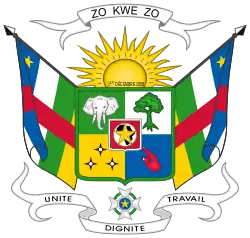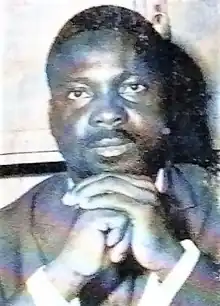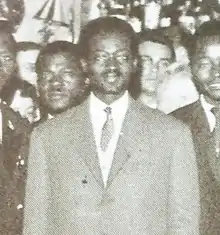1993 Central African general election
General elections were held to in the Central African Republic on 22 August 1993, with a second round on 19 September 1993. They followed the previous year's elections, the results of which had been voided by the Supreme Court due to irregularities.[1]
|
| |||||||||||||||||
Presidential election | |||||||||||||||||
| |||||||||||||||||
| |||||||||||||||||
| |||||||||||||||||
 |
|---|
|
|
The presidential elections were won by Ange-Félix Patassé of the Movement for the Liberation of the Central African People, who defeated Patriotic Front for Progress leader Abel Goumba in the second round. Incumbent president André Kolingba was eliminated in the first round, winning only 12% of the vote. When it became apparent that Kolingba was headed for defeat, he attempted to cling to power by issuing two decrees on 28 August that changed the composition of the Supreme Court and amended the electoral code, which would have allowed the results to be manipulated. However, Kolingba repealed the decrees under heavy pressure from France.[2] The National Assembly election results also saw a victory for the MLPC, which won 34 of the 85 seats, short of a majority. Kolingba's party, the Central African Democratic Rally–the only legally permitted party from 1986 to 1992–finished second, with 13 seats.
When Patassé took office on 22 October, it marked the first—and to date, only—time since the Central African Republic gained independence that an incumbent government peacefully transferred power to the opposition.
Electoral system
The President was elected using the two-round system, with a run-off held after no candidate received a majority of the vote in the first round.
The 85 members of the National Assembly were elected from single-member constituencies, also using the two-round system.[3]
Results
President
| Candidate | Party | First round | Second round | |||
|---|---|---|---|---|---|---|
| Votes | % | Votes | % | |||
| Ange-Félix Patassé | Movement for the Liberation of the Central African People | 302,004 | 38.03 | 363,297 | 53.49 | |
| Abel Goumba | Patriotic Front for Progress | 175,467 | 22.10 | 315,935 | 46.51 | |
| David Dacko | David Dacko Movement | 162,721 | 20.49 | |||
| André Kolingba | Central African Democratic Rally | 97,942 | 12.33 | |||
| Enoch Derant Lakoué | Social Democratic Party | 19,368 | 2.44 | |||
| Timothée Malendoma | Civic Forum | 16,400 | 2.07 | |||
| François Bozizé | Independent | 12,159 | 1.53 | |||
| Jeanne-Marie Ruth Rolland | Central African Republican Party | 8,068 | 1.02 | |||
| Total | 794,129 | 100.00 | 679,232 | 100.00 | ||
| Valid votes | 793,971 | 98.11 | 679,235 | 98.07 | ||
| Invalid/blank votes | 15,317 | 1.89 | 13,362 | 1.93 | ||
| Total votes | 809,288 | 100.00 | 692,597 | 100.00 | ||
| Registered voters/turnout | 1,181,874 | 68.47 | 1,235,568 | 56.05 | ||
| Source: EISA[lower-alpha 1] | ||||||
- In the first round the reported number of valid votes was less than the total of votes cast for the eight candidates; in the second round, the reported number of valid votes was higher than the total of votes cast for the two candidates.
National Assembly
| Party | First round | Second round | Total seats | |||
|---|---|---|---|---|---|---|
| Votes | % | Votes | % | |||
| Movement for the Liberation of the Central African People | 34 | |||||
| Central African Democratic Rally | 13 | |||||
| Patriotic Front for Progress | 7 | |||||
| Liberal Democratic Party | 7 | |||||
| Alliance for Democracy and Progress | 6 | |||||
| David Dacko Movement | 6 | |||||
| National Convention | 3 | |||||
| Social Democratic Party | 3 | |||||
| Democratic Movement for the Renaissance and Evolution of Central Africa | 1 | |||||
| Central African Republican Party | 1 | |||||
| Civic Forum | 1 | |||||
| Movement for the Social Evolution of Black Africa | 1 | |||||
| Independents | 2 | |||||
| Total | 85 | |||||
| Valid votes | 793,981 | 98.11 | 679,235 | 98.07 | ||
| Invalid/blank votes | 15,317 | 1.89 | 13,362 | 1.93 | ||
| Total votes | 809,298 | 100.00 | 692,597 | 100.00 | ||
| Registered voters/turnout | 1,191,374 | 67.93 | 1,235,568 | 56.05 | ||
| Source: EISA | ||||||
References
- Elections in the Central African Republic African Elections Database
- Elections held in 1993 IPU
- CAR: 1993 National Assembly election results EISA

